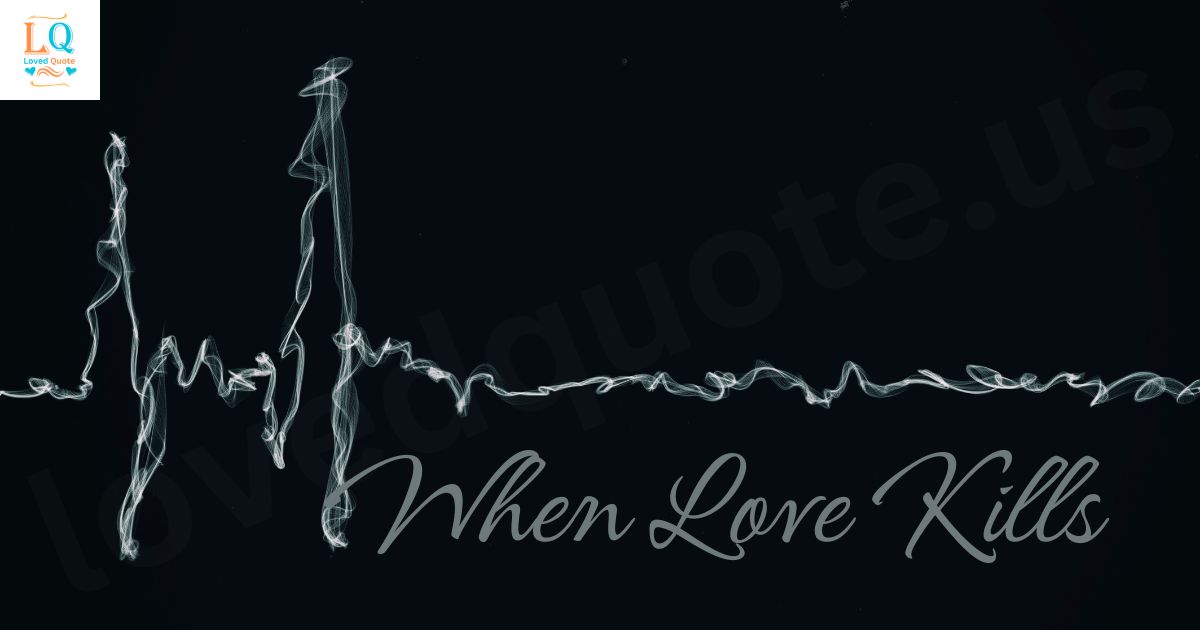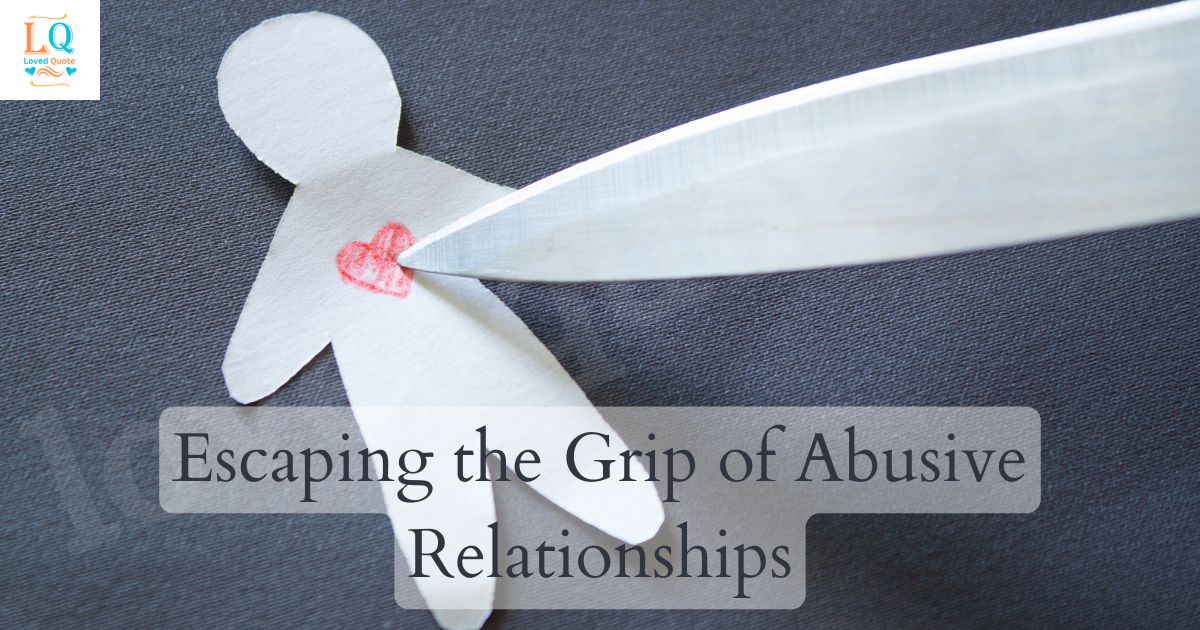The repercussions of a relationship gone wrong can be catastrophic. A tragic love story, “When Love Kills” delves into the complex aspects of relationship breakdown. Recognizing the symptoms and consequences of poisonous love is critical in a society where intense feelings can turn deadly. This blog explores the nuances of abusive relationships, illuminating the mental and emotional burdens that are felt by both parties involved.
We hope to bring attention to the problems faced by individuals trying to escape abusive settings and offer support by looking at real-life stories and the opinions of experts. Come with us as we explore When Love Kills the fine line between affection and destruction, with the goal of enabling people to see abuse for what it is, face it head-on, and finally escape.
When Love Turns Toxic

It is believed that love should uplift, support, and nurture. But it has the potential to change into something sinister and harmful in some instances. The first step in escaping a toxic relationship and restoring your happiness is learning to recognize its signals.
1.One Thing to Keep an Eye Out For
Early on, harmful conduct may be mild, unnoticeable, and easy to justify. It is crucial to always pay attention to specific red flags. Isolation from loved ones, controlling conduct, manipulating emotions, and verbal abuse all fall into this category.
2. Comprehending the Mechanisms
Relationships that are toxic frequently repeat a pattern of building tension, exploding, and then mending fences. If you want to escape this cycle and never get caught again, you must understand it.
3. Effects on Emotional and Psychological Well-Care
The effects of toxic love are felt long after the couple has left the relationship. Depression, anxiety, poor self-esteem, or post-traumatic stress disorder (PTSD) are some of the severe emotional wounds that victims may bear.
4. Identifying Possible Allies and Resources
You have company. In order to help you through the difficult process of ending a toxic relationship, there are several resources that are at your disposal, such as hotlines, friendship clubs, counseling services, & legal aid.
5. Accepting the Need for Rest and Healing
Healing and self-discovery are necessary steps on the road to reclaiming one’s life after leaving a harmful relationship. Take care of yourself first, surround yourself with encouraging people, and remember to celebrate each victory along the road to recovery.
Understanding the Cycle From Romance to Abuse
When Love Kills start out as fairy-tale romance, but others take a terrible turn. Recognizing the warning signals and ending toxic relationships requires understanding the romance-to-abuse cycle.
1. The Honeymoon: Happy Beginnings
Very early on, everything feels fantastic. There’s a strong relationship, butterflies in your tummy, and hopes of love and happiness. This stage is full with love, adoration, and enthusiasm.
2. Red Flags
Relationship fissures may form over time. Small disputes turn heated. Increased control or manipulation by your partner. But you believe things will improve and dismiss warning flags as isolated instances.
3. Tension and Escalation
Repeating the loop increases tensions. More frequent and severe arguments. Your partner’s mood swings between remorse and fury. You may walk on eggshells to avoid their wrath.
4. The Break: Abuse Expose
Despite all of your attempts to save the relationship, abuse is confirmed. Physical abuse, manipulation of emotions, and psychological torture destroy love. You know you deserve better so staying in a relationship is dangerous.
5. Regaining Freedom and Power
Breaking the abuse cycle is a brave self-preservation move. Ask reliable friends, family, or experts for help. Remember that your partner’s abuse is not your fault. Regain your authority and construct a dignified existence.
Cultivating Healthy Boundaries and Communication
Maintaining respect, trust, & emotional well-being in every relationship requires defining and respecting limits. appropriate, fulfilling relationships require appropriate boundaries and communication skills.
1. Setting Boundaries
Determine your relationship needs, values, and restrictions. What are your deal-breakers and acceptable behaviors? Declare your boundaries without repercussions.
2. Respecting Your Partner’s Limit
Your partner has boundaries, too. Respect their independence through honoring their boundaries, regardless of how they differ from yours. Find agreement and understanding via empathy, listening intently, and compromise.
3. Communicating Honestly
Healthy relationships depend on good communication. Express your opinions, feelings, and worries without fear of retaliation to promote honest dialogue. Try active listening and empathy to grasp the viewpoint of your companion without stopping or invalidating.
4. Constructive Conflict Management
Conflict is unavoidable in any connection, but it is unlikely to be destructive. Avoid defensiveness and hostility by working together to resolve conflicts. Avoid blaming and criticizing your partner and convey your feelings with “I” expressions.
5. Supporting and Growing Together
Partner work and dedication are needed for healthy relationships. To improve communication, strengthen your relationship, and address difficulties, consider marriage or relationship counseling. Be patient as you grow together as you learn to set boundaries and communicate.
Supporting Loved Ones in Abusive Situations
Discovering a loved one is in a relationship that is abusive can cause helplessness and concern. When Love Kills However, helping them can improve their safety and rehabilitation.
1. Recognizing Sign
Learn the physical, emotional, & psychological indications of abuse. Watch for changes in the person you love’s behavior, manner, and injury or absence reasons.
2. Making Safe Space
Give the person you love a safe, nonjudgmental space to confide. Assure them that you’ll support them and that their experience is not unique. Respect their freedoms and decisions, even if you disagree.
3. Offering Resources and Info
Refer your loved one to local domestic abuse hotlines, homes, counseling places, and legal assistance organizations. Help them create a strategy for security and investigate their possibilities for help.
4. Supporting Emotionally
Accept your loved one’s concerns without ignoring them. Encourage, support, and empathise when they leave an abusive relationship.
5. Promoting Professional Help
Encourage your loved one to see trauma and domestic violence counselors, counselors, or support groups. Provide transportation or attend appointments.
6. Setting Personal Wellness Boundaries
Maintaining an abusive loved one can be extremely draining. Set limits, get help from friends and professionals, and manage stress to prioritize self-care.
Escaping the Grip of Abusive Relationships

The first step in escaping an abusive relationship is learning to recognize the telltale signals, which can manifest in a variety of ways, involving physical, emotional, and mental damage.
- Get Help: Tell someone you trust, whether that’s a professional, a family member, or a friend, about your problems. Get help from local resources like shelters, counseling programs, and hotlines for victims of domestic abuse.
- Put Yourself in harmful Circumstances’ Shoes: Make a plan for how you will stay safe in harmful conditions. Establishing a secret word for calling for aid, gathering critical documents, and identifying safe areas to go are all part of this.
- Look into your legal options for getting a restraining order or protection order against your abuser: To learn about your rights and alternatives, you should go to an attorney or a legal assistance group.
- Think About Your Financial Independence: Get a job or apply for a grant if you can so that you can become financially independent as soon as feasible. Being financially dependent on an abusive partner could make it difficult to escape the relationship.
- Time: logistics, and help networks are just a few of the transitional considerations that should go into a well-thought-out exit strategy. Make preparations for your whereabouts and how you want to remain safe.
- When you’re trying to heal and move on from an abusive relationship: It’s important to put your own needs first. This includes your mental, emotional, and physical health. Get help by going to therapy, joining a support group, and doing things that make you happy and strong.
FAQ’s
Conclusion:
Regaining your independence, safety, and happiness after exiting an abusive relationship is, in the end, an inspiring and brave path. You can end the pattern of violence and start over if you know how to spot the warning signs of abuse, reach out to trusted people and resources for help, and make your health a top priority.
Stay strong, because you have support. Countless people and groups are committed to helping abuse survivors by offering them support, assets, and a safe space to recover. Have faith in your inner strength to build a life unencumbered by fear and oppression, no matter how difficult the path ahead may appear.
Be kind to yourself and give yourself permission to seek assistance when you need it as you begin this path of healing and self-discovery. A life of respect, dignity, and affection should be yours. Continue to prioritize your safety and wellbeing, and remember that better times are on the horizon. You deserve a future without abuse, and you can create it for yourself.
I Hope Like “When Love Kills.” Share When Love Kills haring is caring..
More Related:
